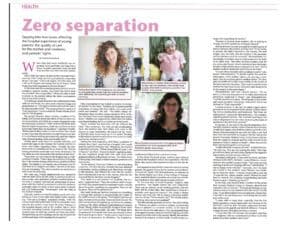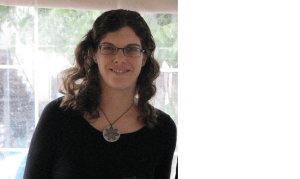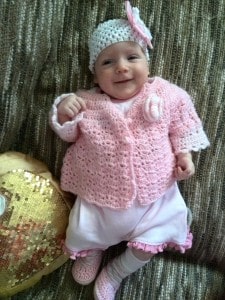T his article first appeared in the Jerusalem Post’s “In Jerusalem” supplement on Friday, April 8. Reprinted with permission.
his article first appeared in the Jerusalem Post’s “In Jerusalem” supplement on Friday, April 8. Reprinted with permission.
Tapping into two issues affecting the hospital experience of young parents: the quality of care for the mother and newborn, and patients’ rights
• By HANNAH KATSMAN
When Gaia (last name withheld) was expecting her second baby, she hoped for a better hospital experience than she had with her first son, who was born prematurely.
Gaia’s older son spent 12 days in the Neonatal Intensive Care Unit.“I only saw him and held him when they let me,” she said. “I felt a lot of pain. He’s two now, and I still can’t imagine not seeing him for 24 hours. I keep imagining what happened to him for 12 days.”
At 30 weeks into the second pregnancy, doctors recommended a cesarean section. Gaia knew she didn’t want the standard “kiss and goodbye,” where the baby is briefly shown to the mother before the father accompanies him or her to the nursery. As Gaia began researching how she could keep her baby with her after birth, she came across a Facebook page and group known as “The rights of babies and mothers not to be separated after birth.” The group promotes a policy of “zero separation,” a term coined by South African physician Dr. Nils Bergman.
The group’s founder, Eliana Ovadia, a resident of Nehalim, first learned about the effects of skin-to-skin contact immediately after birth in a course designed to train breast-feeding counselors. “Skin contact after birth stabilizes the baby’s temperature, heart rate and level of stress hormones better than an incubator,” explained Ovadia. “Babies placed skin-to-skin on their mothers’ bare chests for two hours directly after birth are eight times more likely to start breast-feeding spontaneously, and have higher rates of breast-feeding weeks and months later.”
Ovadia spent many hours in hospital nurseries, and started the page in part because she wanted mothers to know what babies experience there. “Usually the newborns wait in a warming bed for an hour or two. The following procedures alone take only five to 30 minutes. Yet the babies are only returned to their mothers hours later.”
“Separation can occur later in the hospital stay as well,” cautioned Ovadia. “Posted signs ask mothers to bring babies to the nursery during certain hours, and the mothers oblige. The babies in the nursery are undressed until it’s their turn to be weighed and tested. The rest of the time, they are screaming.” She advises mothers to ask to be notified when it’s their turn.
Two years ago, Ovadia implemented zero separation with the birth of her fourth child. In addition to skin-to-skin contact, zero separation includes avoiding delays as the baby is weighed and bathed; performing all procedures with the mother’s permission and in her presence, preferably while the baby is held skin-to-skin or breast-fed; and 24-hour-a-day “rooming-in” with the baby at the mother’s bedside.
Typically, mothers in Israeli hospitals spend a few minutes to an hour or two with their babies before separating. “The care is divided,” explained Ovadia, “with the nursery nurse taking the baby, while the maternity nurse cares for the mother in her ward. The baby ‘belongs’ to the hospital nursery, not to the mother. But in other countries, including Australia, England and Canada, the midwife cares for both the mother and baby after birth. Hospitals here are now finding ways to care for both the mother and baby while keeping them together.”
Dina (a pseudonym) has worked as a nurse in a hospital nursery for five years. “Mothers don’t understand the importance of being with their babies, who need smell, touch and warmth,” she said. “The babies simply cry. Sometimes there are three nurses caring for 30 to 40 babies. We barely have time to feed them, much less comfort them.” Mothers can request to be called when the babies need breast-feeding, but if not, babies are fed by bottle.
“Some mothers feel that they will rest without the baby,” Dina continues, “but they are full of adrenaline. Soon, the mothers miss their babies and come to the nursery in tears. Sometimes, the nurses tell the mother that the baby has to warm up in the ‘griller’ [heating bed] or that he doesn’t need to nurse now, when he really needs to be with his mother.”
During her first pregnancy, Roni Beeri, a resident of Kibbutz Bror Hayil, searched for a hospital that would treat her and her newborn well. Ultimately, she decided to give birth at home. “When I found Eliana’s page, I was intrigued,” said Beeri. Thanks to Beeri’s marketing skills, the zero separation group went viral, with some posts getting hundreds of thousands of views. The third owner of the group, Reut Segall, collates research, protocols and testimonies.
“In the nursery,” Beeri said, “babies cry without getting a response. For nine months, the baby has been attached to its mother via the umbilical cord. After birth, the baby is still attached, just without the cord. But the mother hasn’t internalized that she is the mother, that she has responsibility for the baby, not the hospital.”
“Our tactic is to put pressure on hospitals, one at a time,” explained Beeri. “First, the mothers call the hospital – both the nurseries and the maternity wards – and ask about the policy regarding zero separation. Next, we call the press. Then, the hospital calls us.”
Beeri and Ovadia say that the hospitals are scrambling to change their policies to accommodate the wishes of the 5,000 women in the group. “If a hospital’s policies are rigid, we warn mothers away. That costs them money. We have had meetings at hospitals up and down the country, including The Rabin Medical Center-Beilinson Campus [Petah Tikva], Ichilov Hospital [Tel Aviv]and Sheba Medical Center [Tel Hashomer],” she said. “We bring them the protocols of hospitals both here and abroad, to show them how it can be done.” Sheba used to require four to six hours of observation for all babies. The hospital recently reduced that time to one to two hours.
In the closed Facebook group, mothers learn what to ask for at the hospital to ensure zero separation. After the birth, they report their experiences down to the last detail.
Zero separation taps into two issues of concern to young parents: the quality of care for the mother and newborn, and patients’ rights. Nili Aleksandrowicz, an attorney at the Patient Rights Law Clinic at the College of Management Academic Studies, has taken on several cases involving violations of the rights of parents and newborns.
“In the early days of Israeli hospitals,” explains Aleksandrowicz, “the health system was very patriarchal. There was an attitude of not trusting patients, that the baby will be looked after, that everything is done in a scientific and organized manner.” She recalls a Monty Python skit from the ’70s in which a laboring mother asks the doctor, “What should I do?” The doctor replies, “Nothing, dear, you’re not qualified!”
“But there are also genuine concerns,” she acknowledges. “Women are often in shock or trauma, or recovering from an epidural or a cesarean section, so it’s hard for them to care for the baby alone. If you are separated from your support system, someone needs to help you, and the hospital provides that in the nursery. Ideally, the mothers shouldn’t be isolated, and the family should remain as a single unit supporting the mother.”
“Because of pressure from mothers, this is starting to change, but the hospitals are not happy about it.”
Aleksandrowicz has read accounts in Ovadia’s group of friction between the mother and the staff. “If the mother protests the baby’s removal to the nursery, the staff simply takes the baby. But the mother is the guardian, and her decision must be honored.” Aleksandrowicz acknowledges that there may be valid reasons for the baby to be taken away. “But often the baby is taken away for six, seven, eight hours. I don’t understand how the hospital takes responsibility from a legal point of view – that a mother could be denied her request to see her baby.”
“In cases where the staff notes a medical concern,” continued Aleksandrowicz, “it should explain the need for observation. If the mother objects, she can sign a statement that she is going against medical advice. The hospital and staff have to take responsibility for the health of the baby, but they cross lines. They need to explain to the mother the true level of risk. Not every baby needs to be in the nursery to the same degree.”
Aleksandrowicz cites two relevant statutes. “All patients, in this case the parents of the baby, must have all procedures explained to them,” said Aleksandrowicz. “And the parents must agree. The language in the maternity wards should be ‘You decide.’ Instead it’s ‘You’re not allowed’ or ‘That’s impossible.’”
A recent revision to the law on patient rights allows patients to be accompanied by the person of their choosing during examinations and treatment. “But there are implications,” cautioned Aleksandrowicz, “for example, regarding patient privacy. The hospitals must figure out ways to implement the law while protecting the rights of newborns to be with their mothers.”
In January, at the end of her second pregnancy, doctors told Jerusalem mother Hedva Shachar that her baby would need surgery after birth to remove a growth in her kidney. Shachar wanted to stay with her baby, as she had done after her first birth in England. But the staff at Hadassah-University Medical Center in Ein Kerem told her that she would be released and her baby moved to the nursery in Ward A, instead of Ward C, where she and the baby had stayed together continuously.
“I called the baby’s surgeon at home,” recalled Shachar. “He told me, ‘You are not leaving the baby.’ This happened three times, and each time, thanks to the surgeon’s intervention, they let me stay with her.”
The surgery took place 11 days after the birth, and after 48 hours in the NICU, the baby – named Rebecca – was released to the pediatric surgical ward. “Very soon she was nursing properly and sleeping with me,” said Shachar. “I was so happy to be with her.” Ironically, once the baby was moved to the pediatric ward, Shachar was forbidden to leave her alone. “I shared a room with a very big 17-year-old boy, whose mother wasn’t allowed to leave him for a minute. But a helpless, breast-feeding, tiny baby before surgery – ‘Mummy, go home!’”
In the end, Gaia learned from a mother in the group that Laniado Medical Center in Netanya allowed zero separation after a cesarean. “They placed the baby on my chest as soon as he was removed from the womb,” recalls Gaia. “I was able to talk to him and calm him. I forgot that I was still in an operating room. Everything but my baby just melted away.
“I came with so many fears, especially that the first birth experience would repeat itself. But because of the fact that I could be with the baby, experience the feelings, and recover quickly, my life feels different. It helped change the way I feel about myself as a mother.
“I hope that this will become the standard, and that our daughters will not understand how they could take babies from their mothers after birth.”
You may also enjoy:
Interview with Dr. Richard Joel
“I waited and waited but they didn’t call me”



I have seen what is being described here – baby taken care of by the baby nurse and the mother by the mother nurse, the babies waiting in line to be cared for in the nursery and screaming their heads off while waiting BUT this is not the case in Hadassah Ein Kerem even in Alef and Bet which are not 24 hour rooming in wards. I work as a nurse and lactation consultant in Bet. Our policy is rooming in until 11 at night from 5 in the morning after the initial reception (which I admit it too long and for no reason) After that the baby is cared for by the same nurse as the mother and doctor checks are done next to the mother. Mothers and fathers often accompany me to bathe and weigh their babies which I do one at a time without a line. Mothers and babies do not need to be separated at all until 11 at night (which is also terrible but something too many mothers choose.) If there are babies crying in the nursery before that, it is because their mothers have chosen to put them there. Unless there is something written further down the article, the person being interviewed is painting an inaccurate picture of what is happening in Israel hospitals. By the way, I am completely for zero separation and can’t imagine how mothers can be calm without their newborns next to them if not in their arms.
Thank you for the clarification! Eliana Ovadia said that she would send all the mothers in her group to HEK Gimmel if she could, because they have zero separation throughout the hospital stay. And it’s great that the mothers and babies are cared for together after birth in all the HEK wards, unlike in most hospitals. The fact that the babies cannot leave the nursery at night in the other wards is still an issue that hopefully will be corrected soon. Thank you for the love and care that you give to mothers and babies!!
I gave birth in Ein Karem and the baby was with me from the moment he came out until we were released from the hospital. I asked at the start for biyut malei and got it. If I had been told there was no room, I would have fought.
My next baby was born in Soroka, and we were separated for 2.5 hours. Thankfully, my husband went with her to the tinokiya. If he hadn’t, they would have given her formula, possibly without even telling me they’d done it. After that, I had biyut malei, but why 2.5 hours separation, and why didn’t they just have the warming bed in the delivery room like they did in Ein Karem?
Also, it was only 2.5 hours separation BECAUSE my husband was there. My roommate had 5 hours separation, and there were people with even 7 hours. 4 hours seemed to be the norm, and 2.5 the minimum. Because there was an abba to bug the staff, and they saw that someone is actually waiting for this baby to go back to its mother, they sped it up. If he hadn’t been there? I’m pretty sure it would’ve been four hours, maybe even five, before I got her back.
Oh, yeah, and we forgot the screaming babies, screaming because they need to be held but there just aren’t enough arms to go around.
It makes me sick to hear mothers celebrating and praising the post-birth separation and keeping the baby in a tinokiya the entire time “so that mom can sleep”. How can you sleep without your baby?